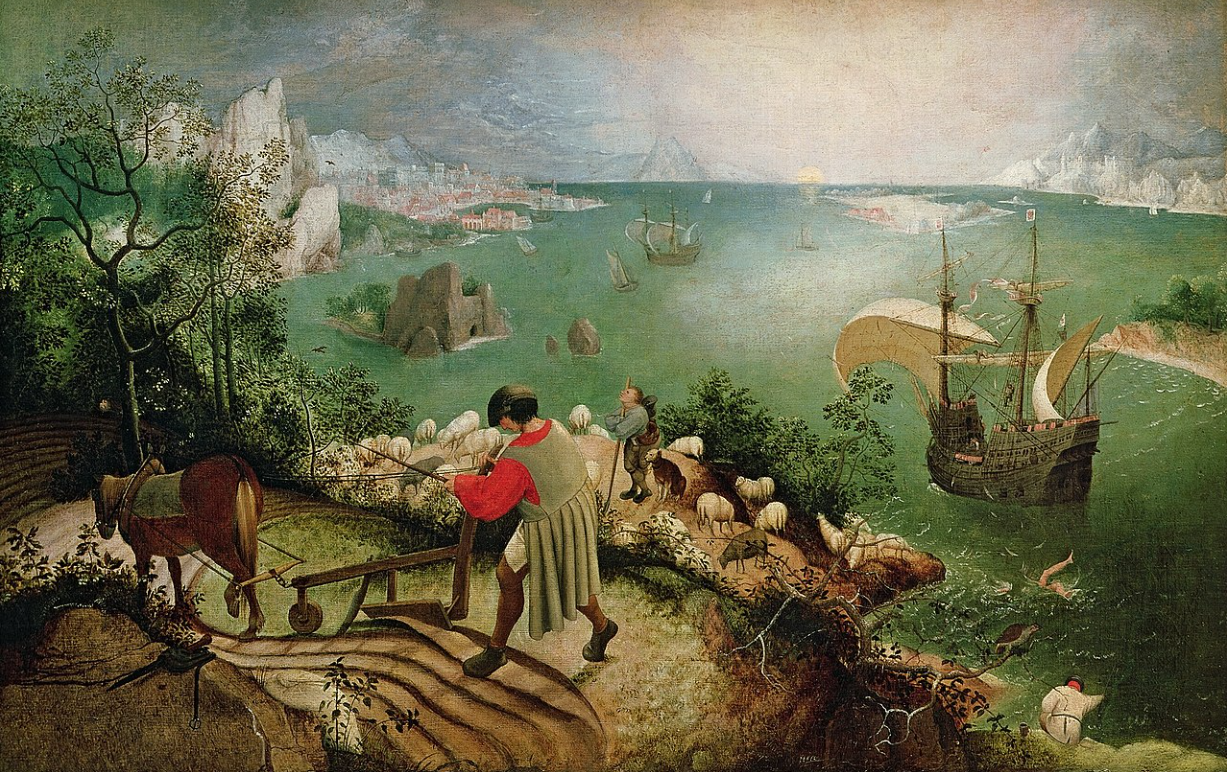The Fall of Icarus
 Figure: Landscape with Fall of Icarus by Pieter Bruegel the Elder (supposedly)
Figure: Landscape with Fall of Icarus by Pieter Bruegel the Elder (supposedly)
Looking at the painting above, at first glance, your attention may be drawn to the nondescript farmer plowing the land, or a shepherd with his dog herding sheep, or the vast ocean with majestic ships, or the towns and mountains in the distance.
Upon second glance, you might notice something deeply strange and unsettling. In the lower right corner, a man appears to be drowning with both legs desperately flailing about. This seemingly innocuous painting actually depicts one of the most well-known event in Greek mythology: the fall of Icarus.
In Greek mythology, Icarus long dreamed of flying and escaping the island of Crete. His father, a master craftsman, built him a pair of wings made from feather and wax. Before giving the wings to Icarus, he warned him of two dangers: one of complacency, and one of hubris. By flying too low, the wings could potentially collect moisture from the ocean and clog. By flying too high, the heat of the sun might melt the wax holding the feathers together. Not heeding his father’s warning, Icarus “flew too close to the sun” as the saying goes, and fell tragically to his death.
Yet as we look at this painting, the death of Icarus is not even the third thing one notices. In fact, without knowing the title of the painting beforehand, it is quite plausible that one might miss the small patch of disturbance in the lower right corner. The death of Icarus, this tragic fate of mythical proportions, is but part of the backdrop to some farmers working the land. It is painted no bigger the sheep that roams the hills, given no particular emphasis as to be completely unremarkable; and perhaps in the grand scheme of the universe, it is. What an apt analog to all of life’s trials and tribulations, and to our inner turmoils.
Difference in Interpretation
Despite the severity of the situation - and to Icarus - the last few seconds of his life, the farmer continues to plow, completely unware of an imminent death. The world appears to move on dispassionately with or without Icarus.
Depending on your perspective, this painting is either incredibly liberating, or deeply depressing. It is a cruel and humbling reminder that no matter how big or small a problem we are currently faced with, no matter how critical its resolution might seem to us, at the end of the day, nobody else cares. It matters not whether you are at a critical cross-road of your life, or the absolute depth of your misery, or the very acme of your achievements, the world is completely, and utterly apathetic.
I adore this painting precisely because of this bifurcation in interpretation. You can choose to read this painting many ways. I choose to interpret this artwork as profoundly liberating.
My once debilitating preoccupation of how others perceive me all of the sudden seems silly. By understanding that I am my worst critic, and that those uncountably infinite embarrassing things I’ve done as a teenager are remembered by no one else but me, I feel about 100 lbs lighter.
Comments